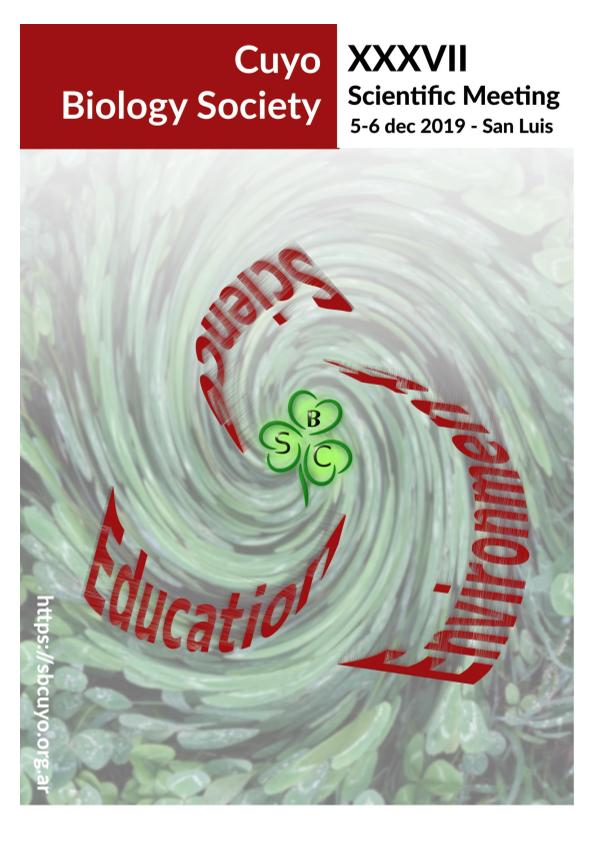Mostrar el registro sencillo del ítem
dc.contributor.author
Neira, Flavia Judith

dc.contributor.author
Torrecilla, Norma Mariana

dc.contributor.author
Pennacchio, Gisela Erika

dc.contributor.author
Soaje, Marta

dc.contributor.author
Jahn, Graciela Alma

dc.contributor.author
Seltzer, Alicia Mabel

dc.contributor.author
Valdez, Susana Ruth

dc.contributor.other
Piezzi, Ramon Salvador

dc.date.available
2024-03-18T10:41:26Z
dc.date.issued
2020
dc.identifier.citation
Long-term effects of neonatal hypoxia on anxiety-related behaviors and hormonal response to acute stress; XXXVII Annual Meeting ot the Cuyo Biology Society ; San Luis; Argentina; 2019; 24-24
dc.identifier.issn
0327-9545
dc.identifier.uri
http://hdl.handle.net/11336/230731
dc.description.abstract
Neonatal lesions in the brain have less severe effects than in adults due to the neuronal plasticity of the developing nervous system, although they can cause cognitive and behavioral sequelae. Previously, we found that neonatal hypoxia (NH) transiently affected the expression of proteins associated with synaptogenesis in certain brain areas. The intermingled neural circuits controlling both stress and anxiety suggest a strong relationship between stress experiences and anxiety in both healthy and pathological conditions. We evaluated the long-term effects of NH on anxiety parameters and in stress-induced hormone release in adult female (estrous day of rat cycle) and male rats. Sprague Dawley rats at 4 Post-Natal Day (PND) were exposed to an atmosphere of low oxygen level (6.5% O2 and 93.5% N2) for 70 min. 4PND control pups were exposed to normal oxygen levels (Co) for 70 min. The humidity and temperature conditions were controlled. Pups were then returned with their mother until weaned, and then they were allowed to grow. At 3 months of age, both groups of rats were subjected to two tests, Elevated Plus Maze (EPM) to measure anxiety parameters and a stressful challenge to determine hormone response to acute stress (exposure to ether vapors for 2 min). EPM reflected an unconditional aversion to heights and open spaces, an anxiogenic behavior. The hormonal response to stress included the release of pituitary prolactin (PRL), adrenal progesterone (P4), and adrenal corticosterone (CORT). Blood samples were collected before and after 5 min of stress exposure for serum hormone determinations by RIA. In the EPM test, both female and male hypoxic rats increased the number of entries to the open arms (OA) and the time spent in the OA compared to Co (P<0.05). The results obtained indicated an anxiolytic-related behavior induced by NH, that was higher in female than in male hypoxic rats. Basal levels (unstressed) of PRL and P4 in NH rats remained similar to Co ones in both sexes. Only in female rats, NH increased the basal levels of CORT compared Co rats (P<0.05). In female and male rats, the hormonal release of PRL, P4, and CORT induced by stress, were differentially affected by NH. Hypoxia attenuated the stress-induced PRL secretion in female rats (P<0.05) while this response was blocked in males. The release of CORT by stress was blunted in both sexes by NH. The release of P4 by stress was inhibited in NH female but it was preserved in male rats. In conclusion, the long-term effects of NH were influenced by sex. NH altered the anxiety levels and the hormonal response to stress in adulthood. The alterations caused by NH at the brain level could be influencing the appropriate response to situations of stress and anxiety in adulthood.
dc.format
application/pdf
dc.language.iso
eng
dc.publisher
Tech Science Press

dc.rights
info:eu-repo/semantics/openAccess
dc.rights.uri
https://creativecommons.org/licenses/by/2.5/ar/
dc.subject
NEONATAL HYPOXIA
dc.subject
ELEVATED PLUS MAZE
dc.subject
STRESS
dc.subject
PROLACTIN
dc.subject
CORTICOSTERONE
dc.subject.classification
Bioquímica y Biología Molecular

dc.subject.classification
Medicina Básica

dc.subject.classification
CIENCIAS MÉDICAS Y DE LA SALUD

dc.title
Long-term effects of neonatal hypoxia on anxiety-related behaviors and hormonal response to acute stress
dc.type
info:eu-repo/semantics/publishedVersion
dc.type
info:eu-repo/semantics/conferenceObject
dc.type
info:ar-repo/semantics/documento de conferencia
dc.date.updated
2023-02-16T10:49:49Z
dc.identifier.eissn
1667-5746
dc.journal.volume
44
dc.journal.number
Suppl. 1
dc.journal.pagination
24-24
dc.journal.pais
Estados Unidos

dc.description.fil
Fil: Neira, Flavia Judith. Consejo Nacional de Investigaciones Científicas y Técnicas. Centro Científico Tecnológico Conicet - Mendoza. Instituto de Medicina y Biología Experimental de Cuyo; Argentina
dc.description.fil
Fil: Torrecilla, Norma Mariana. Consejo Nacional de Investigaciones Científicas y Técnicas. Centro Científico Tecnológico Conicet - Mendoza. Instituto de Medicina y Biología Experimental de Cuyo; Argentina
dc.description.fil
Fil: Pennacchio, Gisela Erika. Consejo Nacional de Investigaciones Científicas y Técnicas. Centro Científico Tecnológico Conicet - Mendoza. Instituto de Medicina y Biología Experimental de Cuyo; Argentina
dc.description.fil
Fil: Soaje, Marta. Consejo Nacional de Investigaciones Científicas y Técnicas. Centro Científico Tecnológico Conicet - Mendoza. Instituto de Medicina y Biología Experimental de Cuyo; Argentina
dc.description.fil
Fil: Jahn, Graciela Alma. Consejo Nacional de Investigaciones Científicas y Técnicas. Centro Científico Tecnológico Conicet - Mendoza. Instituto de Medicina y Biología Experimental de Cuyo; Argentina
dc.description.fil
Fil: Seltzer, Alicia Mabel. Consejo Nacional de Investigaciones Científicas y Técnicas. Centro Científico Tecnológico Conicet - Mendoza. Instituto de Histología y Embriología de Mendoza Dr. Mario H. Burgos. Universidad Nacional de Cuyo. Facultad de Ciencias Médicas. Instituto de Histología y Embriología de Mendoza Dr. Mario H. Burgos; Argentina. Universidad Nacional de Villa Mercedes; Argentina
dc.description.fil
Fil: Valdez, Susana Ruth. Consejo Nacional de Investigaciones Científicas y Técnicas. Centro Científico Tecnológico Conicet - Mendoza. Instituto de Medicina y Biología Experimental de Cuyo; Argentina
dc.relation.alternativeid
info:eu-repo/semantics/altIdentifier/url/https://sbcuyo.org.ar/wp-content/uploads/2021/07/2020-XXXVII-Scientific-Meeting-of-the-Cuyo-Biology-Society2.pdf
dc.conicet.rol
Autor

dc.conicet.rol
Autor

dc.conicet.rol
Autor

dc.conicet.rol
Autor

dc.conicet.rol
Autor

dc.conicet.rol
Autor

dc.conicet.rol
Autor

dc.coverage
Nacional
dc.type.subtype
Reunión
dc.description.nombreEvento
XXXVII Annual Meeting ot the Cuyo Biology Society
dc.date.evento
2019-12-05
dc.description.ciudadEvento
San Luis
dc.description.paisEvento
Argentina

dc.type.publicacion
Journal
dc.description.institucionOrganizadora
Sociedad de Biología de Cuyo
dc.source.revista
Biocell

dc.date.eventoHasta
2019-12-06
dc.type
Reunión
Archivos asociados
